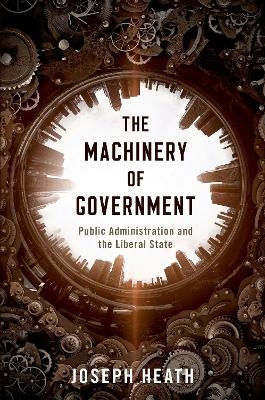
The Machinery of Government
Oxford University Press Inc (Verlag)
978-0-19-762832-4 (ISBN)
In most liberal democracies for example, the central bank is as independent as the supreme court, yet deals with a wide range of economic, social, and political issues. How do these public servants make these policy decisions? What normative principles inform their judgments? In The Machinery of Government, Joseph Heath attempts to answer these questions. He looks to the actual practice of public administration to see how normative questions are addressed. More broadly, he attempts to provide the outlines of a "philosophy of the executive" by taking seriously the claim to political authority of the most neglected of the three branches of the state. Heath both provides a corrective to the prevailing tendency to underestimate the contribution of civil servants to the success of liberal-democratic welfare states, and suggests a more satisfactory account of the principles implicit in public administration.
Joseph Heath is a Professor in the Department of Philosophy and the Munk School of Global Affairs and Public Policy at the University of Toronto. A fellow of the Royal Society of Canada and the Trudeau Foundation, Heath's most recent book is Morality, Competition and the Firm. Heath is also the author of Enlightenment 2.0, winner of the Shaughnessy Cohen prize for Political Writing.
1. Taking Public Administration Seriously
1.1 Inside the machine
1.2 Beyond discretion
1.3 Administrative power
1.4 The permanent civil service
1.5 Political neutrality
1.6 Liberalism or democracy?
1.7 Conclusion
2. A General Framework for the Ethics of Public Administration
2.1 Preliminary clarifications
2.2 Three models of accountability
2.3 The hierarchical model
2.4 The popular model
2.5 The vocational model
2.6 Conclusion
3. Liberalism: From Classical to Modern
3.1 Before liberalism
3.2 The rise of classical liberalism
3.3 The triumph of classical liberalism
3.4 The decline of classical liberalism
3.5 The rise of modern liberalism
3.6 Conclusion
4. Efficiency and the Rise of the Welfare State
4.1 The egalitarian model
4.2 The communitarian model
4.3 The public-economic model
4.4 Assessing the models
4.5 Wagner's law
4.6 The rent-seeking view
4.7 Conclusion
5. Cost-Benefit Analysis as an Expression of Liberal Neutrality
5.1 "Embedded" CBA
5.2 Provision of a public good
5.3 Imposing a regulation
5.4 Assessing safety
5.5 Rationing health care
5.6 Environmental goods
5.7 The three-step procedure
5.8 Conclusion
6. Administrative Discretion and the Rule of Law
6.1 Discretion
6.2 Varieties of discretion
6.3 Discretionary enforcement
6.4 The morality of law
6.5 Administrative law
6.6 Conclusion
7. Paternalism and Individual Freedom
7.1 Mill's argument
7.2 Bureaucratic paternalism
7.3 The Harm Principle
7.4 Hyperbolic discounting
7.5 Cognitive bias
7.6 The nudge framework
7.7 Conclusion
| Erscheinungsdatum | 07.02.2022 |
|---|---|
| Verlagsort | New York |
| Sprache | englisch |
| Maße | 155 x 241 mm |
| Gewicht | 635 g |
| Themenwelt | Geisteswissenschaften ► Philosophie ► Ethik |
| Recht / Steuern ► Allgemeines / Lexika | |
| Recht / Steuern ► EU / Internationales Recht | |
| Sozialwissenschaften ► Politik / Verwaltung ► Staat / Verwaltung | |
| ISBN-10 | 0-19-762832-X / 019762832X |
| ISBN-13 | 978-0-19-762832-4 / 9780197628324 |
| Zustand | Neuware |
| Haben Sie eine Frage zum Produkt? |
aus dem Bereich


